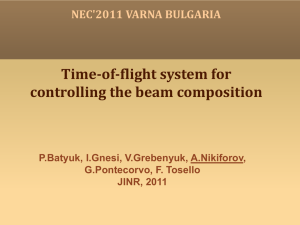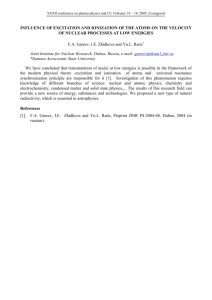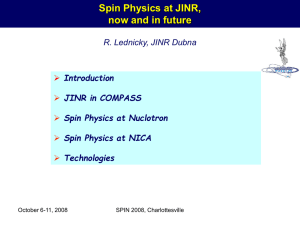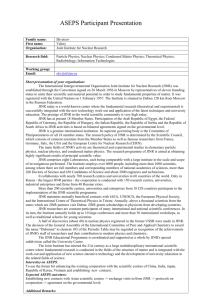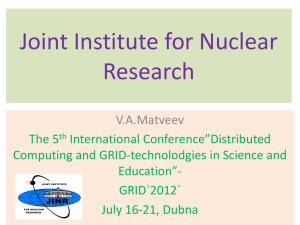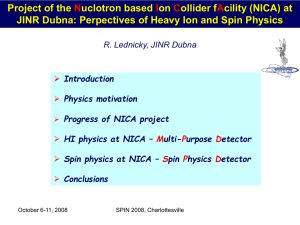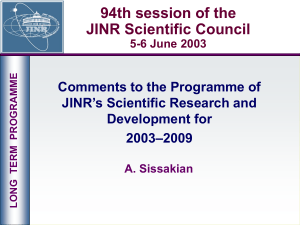G. Trubnikov (JINR)
advertisement
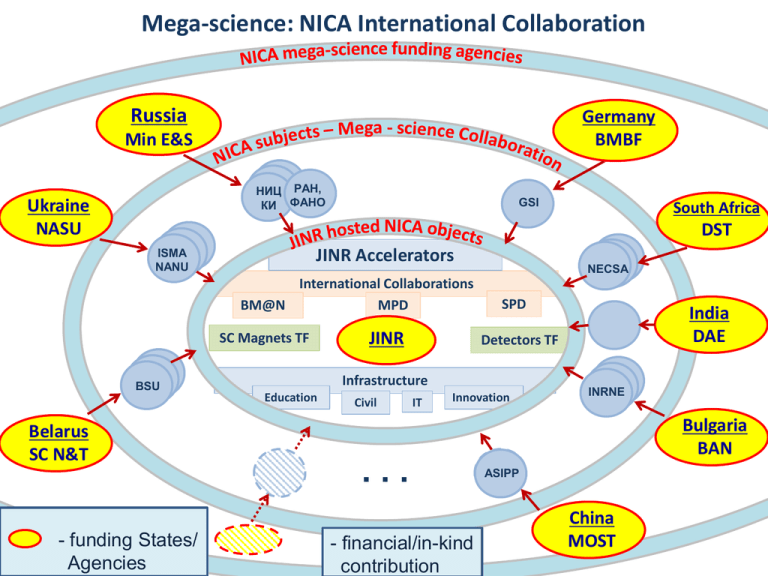
Mega-science: NICA International Collaboration Russia Germany BMBF Min E&S НИЦ РАН, КИ ФАНО Ukraine NASU GSI South Africa DST JINR Accelerators ISMA NANU International Collaborations BM@N MPD SC Magnets TF BSU Belarus SC N&T - funding States/ Agencies JINR NECSA SPD Detectors TF Infrastructure Education Civil India DAE IT Innovation ... - financial/in-kind contribution INRNE Bulgaria BAN ASIPP China MOST Extra-budget funding (megascience) is for: Infrastructure (social and offices: guest houses + multidisciplinary center on site LHEP, large computing center, dedicated area for applied research, additional cryogenics, …) Spin physics (SPD, spin dynamics) R&D for sc proton linac, detector R&D, others. Grant program for students and PhD, visits, NICA “advertisement” and popularization, … Types of Risk Estimate Technology Uncertainty Readiness Most other risks not easily addressed by R&D 3 Ion sources, Linacs Do not see any real serious problem. More less in accordance to schedule. Big delay (1 year) for HILAC – due to technological problems in Germany and Australia. Does not influence on the NICA collider commissioning. Ion Sources – OK, schedule agreed to developers and physicists. Additional personnel – needed: 2-3 engineers. Solving steadely with ITEP, MEPhI, … BOOSTER Magnet system construction and mounting 40 dipole magnets, 24 quadrupole duplets, 24 dipole correctors and 8 multipole correctors Manufacturing rate of magnet yokes is 3 dipoles and 2 quadrupoles per months Finish of magnet yoke manufacturing is planning in middle of 2016. Manufacturing rate is 5 coils per month 6 magnets will tested per months 150 hours is required for testing of one magnet in cryogenic line. Three parallel cryogenic lines will used for testing of magnets. Finish of magnetic tests is June of 2017 Mounting of magnets and lenses in tunnel will be done during halve year in parallel by several teams. Critical point is realization of assembling and tests of magnets in accordance to schedule. Critical issues: - complicate technology of manufacturing of curved elliptic dipole vacuum chamber for ultrahigh vacuum conditions.; - Fast extraction from Booster (cold/warm? septum magnet) + cold beam channel from Booster to Nuclotron + injection to Nuclotron. It is solvable technically in principle, no showstoppers. But we have obvious delay (~1 year) with design and further prototyping for whole channel. Lambertson magnet – unique item, almost impossible ordering outside JINR; - Stripping target – design and simulation in very weak phase (have some concept and raw drawings). WD phase should be pushed and prototyping. Collimation in collider – hot task also. - Cryogenics: compressor hall (equipment is on board). Delay caused by problems with design and construction civil construction company (~1 year); Could be compensated. Does not influence to Booster commissioning directly. - Infrastructure/construction works for Booster (all systems: tunnel, e-cooling, main power converter, cryolines). Delay caused by slow design phase (special radiation safety regulations – requires more time than planned, more special efforts). Staging is organized and process is going; - Design phase for Collider RF2 and RF3 should be started a.s.a.p. Delay caused by funding lack. Now situation is better. We have to make fast solution to start; - To make choice for HV electron cooling system for collider – better a.s.a.p. 2016 could be spent for concept and design (not much money, but moving ahead). Beam dynamics: - It is time to create dedicated BD group/sector (5-7 persons) – “universal team” for simulations/programming/ training students. - Collider lattice optimization. Spin dynamics and “polarized” lattice. Chief Engineer (E.Syresin) – just started. Will have a lot of task. First one (highest priority) is Work Breakdown Structure and planning of the whole project (integration, dependencies, responsibilities). Second one (not less important) – documentation, radiation safety, planning of Nuclotron runs. Personnel • JINR establish a policy (strategy) for special rules of stimulation personnel. In 2016 increasing of salary fund will be 25% (5% - overall, 20% - for key staff (they are 60% of LHEP staff). • Non-budgetary funds actively attracted since 2014. It helps to increase <salary> about 20-30%. • For definite-period entertainment (SC magnet fabrica) – shortterm contracts only. Market is open for whole town. By the beginning of 2014/2015 academic year 226 graduate students have taken part in various JINR educational programs. The JINR PhD program is currently being updated according to a new “Law on Education in RF” and according to the goals of the JINR seven-year plan. International Student Practice (ISP) In total 139 students from 9 JINR Member States have participated in three stages of ISP-2014 (129 last year): ARE-24, Belarus-8, Bulgaria-2, Czech Republic-23, Poland-22, Romania-13, Slovakia-9, South Africa-32, Serbia-5 JINR Summer Student Program (SSP) http://students.jinr.ru In 2014 JINR UC has launched the Summer Student Program. The main distinction of SSP from ISP is a selection of participants on a competitive basis. In 2014 the SSP was organized in the field of accelerator physics and information technologies. 30 applications were received and 8 participants in SSP from ARE, Poland, Czech Republic and Russia were selected by VBLHEP and LIT. In 2015 SSP the scientific fields will be extended to include all JINR research areas. Scientific-engineering group at UC The scientific-engineering group at the University Center was created to implement training programs for engineering physicists. New department “Development of the modern education programmes” was created at JINR University Center. One of the goals is a creation of the educational programs to include current scientific data into the educational process, conduct virtual and online laboratory research based on information and communication technologies Particle Physics is GLOBAL ! Для свободных - все высоты достигаемы (M.Горький) For free individuals - all heights are attainable (M.Gorkiy) Thank you very much ! …What NEXT ?... Experiments on the observation of spontaneous electron–positron pair creation in supercritical Coulomb fields (new 2 compact SC rings with merging bare Uranium beams) Formation of SUPERHEAVY “ATOM” Merging 92+U235 beams E~ 0,6 GeV/u ~ 11 Tm ring …What NEXT ?... e- beam SC linac, 1 GeV, ~ 30m Mass-spectroscopy of radioactive heavy ion beams in isochronous mode (using collider ring) + measurement of massive nuclei PDF with colliding electron beam (up to 1 GeV) …What NEXT ?... SC proton-linac (~10MV/m) Goal: MW proton beam to the target, generating muon and neutrino fluxes p
